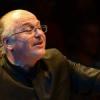Recently, I had the opportunity to speak with Mark Robins. Mark works for a Videogame PR company, and many gamers may not have heard of him. After all, his day-to-day job involves promoting other people’s work, rather than his own.
But there’s another side to Mark, one which many people are aware of. For the last few years now, Mark has worked to secure a higher public profile for Videogame music. His efforts have been successful – every single year since he began his crusade, Videogame music has featured prominently among UK radio station Classic FM’s annual hall of fame. The campaign has garnered plenty of media attention over the years – not just in the specialist press, but the national media too.
When I speak to Mark, he’s in high spirits – 2014 was another successful year for him, with no less than 8 videogame tracks featuring on Classic FM’s latest list, while the amount of Videogame music concerts continue to rise.
DM: What first inspired you to start your campaign? You’ve been at it for a while now and it seems to gain momentum with each passing year, but what first inspired you to get started on this journey?
MR: I first started this back in 2011. I went to the first Final Fantasy: Distant Worlds concert at the Royal Albert Hall in London, which was a huge concert, a sell-out concert. It was a great atmosphere, and I’m a huge fan of the series and Uematsu’s music.
I was the kind of kid who, back when I was in school, would hold a tape recorder up against the tv screen when I was playing a game so that I could make mix tapes of gaming music. I’ve always loved gaming music. I think it’s because, back in the early days, [composers] had so little power at their disposal to create music; they had to get around those limitations by creating super-catchy melodies.
So I went to the Royal Albert Hall, and it was a fantastic concert and celebration of gaming music, and I thought to myself: “You know, no-one is going to hear this outside of the fan base.”
[Gaming music] is easily as good as film music, and film music is regularly played and celebrated - whether that’s at the BBC Proms or the Oscars; but videogame music, which is equally as outstanding, and just as artistic, doesn’t get that same level of recognition.
Classic FM is the largest commercial radio station in the United Kingdom, in terms of listeners, and they have this annual thing where they let their listeners vote for their top 3 favorite scores. Film music gets in there every year, and I thought that videogame music should be there as well. So I made a post on Facebook, and a few people saw it and re-posted it, and it just grew from there.
DM: You mentioned that you don’t think videogame music gets the recognition you feel it deserves; and despite the fact that videogame pieces have appeared in the Classic FM Hall of Fame for 3 years now, there’s still a large number of people who seem unable to accept that it’s deserving of a place on the list. Do you think that things are starting to change, or do you feel that there’s still a long way to go before people accept that videogame music is just as worthwhile as music from any other entertainment medium?
MR: I think that there are a lot of misconceptions still about gaming music. A lot of people still seem to think that it simply consists of beeps and bleeps, and there are people who assume that all games are bad. It was only the other night that I was watching a segment on BBC’s Watchdogs program. Their opening line was: “apparently, it’s not just kids who play videogames.”
It was just skin-crawlingly bad.
So there’s this persistent misconception, and a lot of people still don’t understand there’s a huge amount of artistry that goes into [creating] videogames. But in all honesty, when I first started this thing I wasn’t sure whether Classic FM would accept it, or whether they would laugh it off.
Actually, they have been good about it and really embraced it as a new form of music that they weren’t previously aware of. They’ve done a number of videogame-centric specials now, with more on the way.
So people are starting to understand that there’s a lot of talent in [the gaming industry], and they’re starting to realize that the concerts are selling out very quickly and there’s a huge fan base there.
In a time where Orchestras are struggling to gain an audience, videogame music is a really exciting new genre that really appeals to a large audience – and a younger audience, as well.
So it’s definitely changing; the amount of videogame music that sells CDs and downloads keeps going up all the time, and a few weeks ago the soundtrack for Elder Scrolls Online went on sale and hit the charts. And a while before that, the soundtrack for Batman: Arkham Origins was released, and that got in the charts as well.
The problem is that there is certainly a demographic among Classical fans – and I don’t want to talk ill of them – but I feel that maybe they feel threatened, that their interest is being encroached upon by a younger generation. There are some people who still think “oh, it can’t be Classical music if it’s contemporary.”
Whether it qualifies as Classical music or not is an interesting argument that’s best left to music theorists; but for me personally, with the amount of adulation and recognition that movie composers get, I really think that videogame composers should get that sort of recognition as well. [Videogame music] can be just as creative, and just as moving, as anything else; I feel it should be celebrated.
DM: Do you think that many people dismiss Videogame music purely because it’s from a game, rather than assessing it on its own merits? Many people who dismiss music from games will happily embrace compositions created for films, for example.
MR: Yes, absolutely. During one of the previous Videogame specials on Classic FM – and they’re starting to gradually creep into [the station’s] regular playlist - the host made a point about how if you didn’t know a piece was from a game, you wouldn’t be able to tell.
One problem though is that the mainstream press still quite often give Videogames a bad reputation, and will happily use them as a scapegoat for society’s evils. [The Classic FM campaign] is a way of showing the public that actually [Videogames] are incredible works of entertainment - created by incredibly talented people.
But it’s changing, and it’s actually surprising watching how some people are gradually becoming more accepting. I’m not sure what the exact numbers were, but the amount of interest in Classic FM when their dedicated videogame music shows hit was just phenomenal.
DM: It’s great that people who aren’t even particularly interested in playing games are starting to become more able to appreciate the medium in all its forms.
MR: There was a really great quote I saw recently from one lady who said “I’m normally a Swan Lake kind of girl; I didn’t realize that I loved Grand Theft Auto as well.” [Laughs]
It’s really interesting seeing how the genre is slowly building traction; I’m not trying to turn Opera fans into Videogame music fans – that’s not what I’m about. My aim has never been to crash the charts and make some sort of Rage Against The Machine-style statement; it’s always been about trying to get the recognition that I think the music deserves.
And in a way, it’s also about getting people drawn in; they listen to one type of music, and they listen to other types of music of the back of it, and that’s amazing too. There’s lots of great music out there, and I think getting people more interested in film music and videogame music can act as a bridge towards that.
DM: The gaming industry is kind of where the film industry was 80 years ago; it’s starting to get accepted, but there are still many people who dismiss it, who think that there will never be a work that can rival productions such as Shakespeare. Do you think we’re seeing society becoming more accepting of the medium?
MR: Absolutely. There are so many different genres now, spread across so many different platforms such as mobile phone games and tablets, that I really think the appeal of gaming is wider than ever before. But I think you make a really interesting point, about how the gaming industry is where the film industry was 80 years ago.
80 years ago, the movie industry started to experiment with new styles of music, and I think that the gaming industry is at that stage, too. I don’t want to say that gaming music has become generic, but we’ve gone through a phase where many games have followed various tropes; but we’re starting to see more experimentation with different styles.
There are still plenty of games which seem to play it safe, but there’s loads coming out now which really experiment with sounds and ideas, and take that traditional orchestral sound and push it in new directions. Take, for example, the Tomb Raider reboot, and the way it uses percussion. Or the Remember Me soundtrack, which takes that very traditional orchestral sound and kind of warps it to create a slightly discordant effect.
DM: And you have Jeremy Soule’s work on the Elder Scrolls series, which sometimes almost seems reminiscent of Wagner; or Super Mario Galaxy, which occasionally evokes Vivaldi. But there’s also games like Mass Effect, which is heavy on synths but no less evocative - or any more simplistic.
MR: There’s some really great stuff coming out at the moment, and it’s a really interesting time. There are some very promising composers coming out and many well-loved pieces. It’s a really interesting, exciting time for the medium and it’s great that it’s starting to get recognition.
People are starting to notice [the industry] now and take it seriously; it’s being discussed in places like, for example, the Houses of Parliament, and we’ve seen tax breaks in the UK.
DM: Thinking back to classic games like Sonic the Hedgehog and The Legend of Zelda, as those franchises get older their music is becoming much more orchestrated. But it sometimes feels as though there is a reaction to that trend brewing amongst developers – there’s been a resurgence of interest in the chiptune scene in recent years, and many developers have abandoned the option to make more realistic pieces and instead go back to the 8-bit compositions that many older gamers remember from their childhoods.
Do you think this is a good thing, and that both approaches can happily exist side by side?
MR: I think they can totally exist side by side.
For one, creating orchestral music is hugely expensive. And let’s not forget that videogames are one of the few remaining areas where people are still willing to create authentic orchestral soundtracks. Big-budget movies still do, but a lot of TV soundtrack composition now is all done via sound libraries, simply because it’s so expensive.
In many ways, it’s about what fits the game. If you’re going to create a really stylized pixel-art style of game, I don’t think an orchestrated soundtrack would fit that experience – I’d expect to hear some chiptune music.
The important thing is that the reason people love gaming music so much is that it’s great stuff; it’s been composed by really great artists with massive amounts of integrity and talent.
DM: Who is your personal favorite composer of all time?
MR: I have two answers to that, really.
Obviously, Nobuo Uematsu. But another would be Chris Huelsbeck, who composed the music for the Turrican games. [Huelsbeck] started composing stuff on the C64 before moving on to the Amiga, and he’s still working on stuff today. His stuff is very synth-based; it’s all about very up-and-down melodies and soundtracks, and he was one of the early pioneers of the chiptune scene.
He had a Kickstarter project a year before last to fund a Turrican soundtrack anthology and he was pretty successful; he raised $175,000, and he was only asking for $75,000.
I also really enjoy Yasunori Matsuda’s work, the composer behind the Chrono Trigger and Chrono Cross games.
One of my favorite soundtracks is actually the soundtrack to the original Medal of Honor on the first PlayStation, by Michael Giacchino. The interesting story about Giacchino is that he created one of the very first truly orchestral soundtracks in a videogame with his work on The Lost World: Jurassic Park. The developers couldn’t afford to get John Williams in to compose the score, so instead they went to a young Giacchino, as he has a very similar style. The next project he worked on was Medal of Honor [Editor’s note – it’s worth mentioning here that Giacchino was no stranger to the videogame world prior to his work on The Lost World; he’d previously composed the soundtrack to The Lion King videogame adaptation, as well as Gargoyles on the Sega Genesis] , which of course came off the back of Saving Private Ryan - another Spielberg film scored by Williams.
[Giacchino's] career has pretty much come full circle actually, because now he’s composing the score for the new Jurassic Park movie. Wherever John Williams goes, Giacchino seems to follow; and he also seems to be the composer of choice for J. J. Abrams.
One of the things about the original PlayStation of course is that it was CD-based, so suddenly developers had all this space to work with for the music.
DM: If you had to name your top 3 compositions, what would they be, and why?
MR: If I had to pick individual tracks rather than entire soundtracks, to start with I’d have to go with Zanarkand from Final Fantasy X. The version from [the] Distant Worlds [concert] is actually the ringtone on my phone! I just think that’s an amazing piece of music.
I’m not actually a huge fan of Final Fantasy X as an entry in the series, but it has a truly amazing soundtrack.
Next, I’d have to say the main theme from Medal of Honor. It wasn’t the first game to feature an orchestrated soundtrack, but it was the first orchestrated music that I personally heard, and so it holds a special place in my heart. Playing a game on a PlayStation was a huge step up in visual quality [at the time], and it was a great example of the FPS genre working well on home consoles. It just sounds like a movie soundtrack, and for me it was pretty mind-blowing.
Medal of Honor was very much the Call of Duty of its day, and it doesn’t get enough credit.
My final choice… God, this is difficult. I’d have to go with Gusty Garden Galaxy from Super Mario Galaxy, or the main theme from Kingdom Hearts.
DM: Where do you hope gaming music will be in terms of its public acceptance and recognition in 3 or 4 years’ time?
MR: I would like to see it as ubiquitous as movie soundtracks, to be honest. I’d like to see videogames soundtracks given the same kind of exposure. I think we’re getting there. We have a Best Soundtrack award at the gaming BAFTAs now, and it’s becoming one of the key awards now I think.
I’d also like to see more exposure on radio, to the point where it’s no longer such a big deal [when it gets played], and more live shows. I know that putting on a concert is a hugely expensive endeavour, but we’ve had one concert [in the UK] so far this year, and by the end of the year we’ll have had four just in London, with at least another three going on around the country. But a few years ago we had none.
Whatever kind of music you’re into – whether it be Classical, or Funk, or Rock, whatever – I think that they only way you can truly hear and appreciate it, is to see it live. And whatever kind of music, I love going to concerts and seeing it performed by an orchestra.
They are so loud! They don’t need amplification.
So I’d definitely like to see more concerts. My great hope is to see Videogame music at the [BBC] Proms. I think if we can achieve that, then we’ll know that we’ll have really entered the public consciousness and it will lead to greater acceptance.
DM: Last but not least, Cake or Pie?
Cake! I have a sweet tooth, so I do love a good cake.












